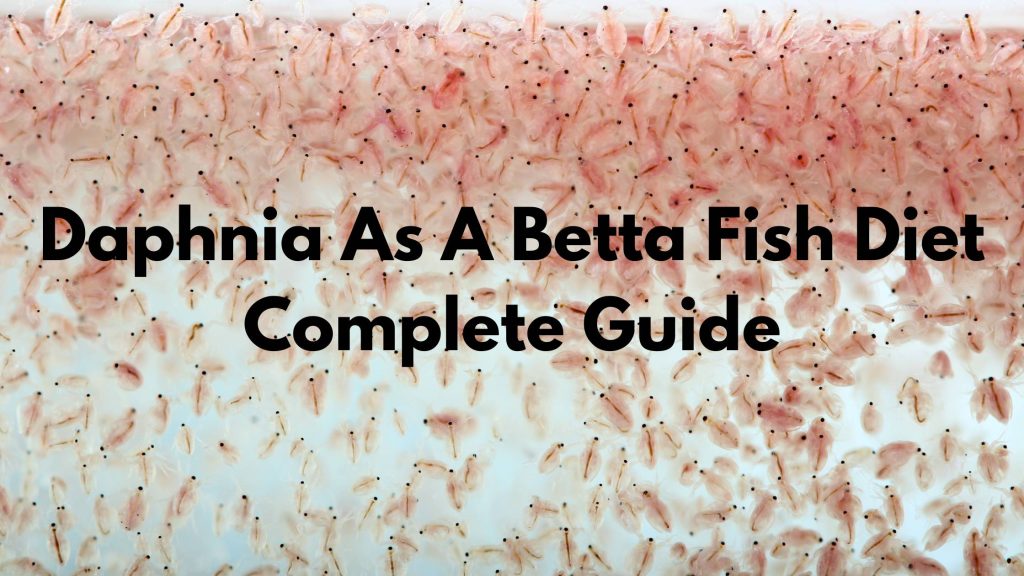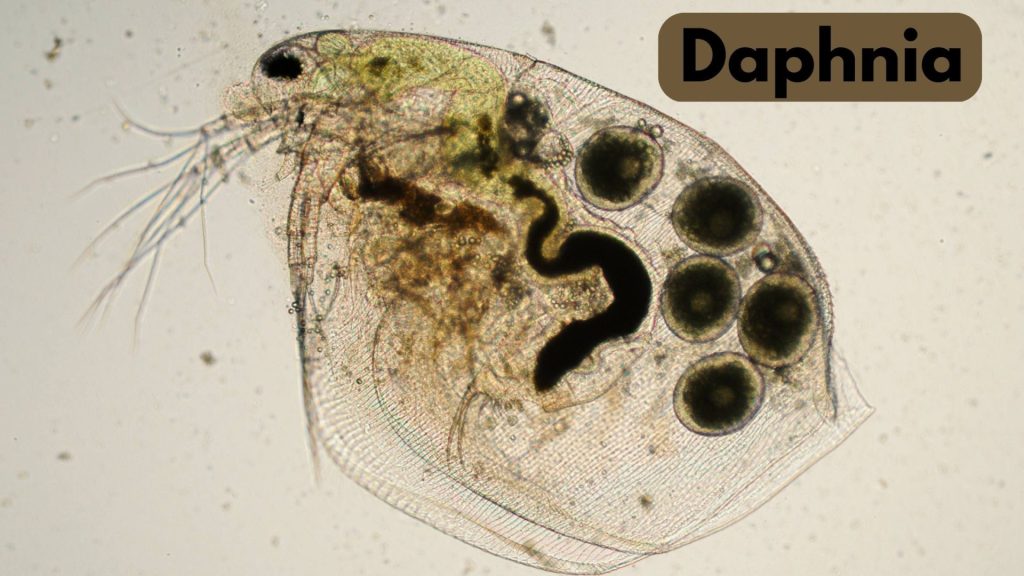Daphnia, commonly known as water fleas, are small aquatic crustaceans widely used as a food source for betta fish. Biologically, daphnia for betta is the best option for several reasons.
Firstly, daphnia is high in protein, an essential nutrient for fish growth and development. They contain up to 70% protein, making them an excellent source of dietary protein for betta fish.
Secondly, daphnia is rich in amino acids, which are the building blocks of protein. Amino acids are essential for the proper functioning betta fish’s body processes, including muscle development, digestion, and immune system function.
Thirdly, daphnia is a good source of vitamins and minerals, including vitamins A, D, and E, as well as calcium, magnesium, and phosphorus. These nutrients are essential for maintaining good health in betta fish, including healthy skin and scales, strong bones, and a healthy immune system.
Finally, daphnia is low in fat, making them an excellent food source for betta fish prone to obesity. Obesity in betta fish can lead to health problems such as swim bladder disorder, which can affect their ability to swim and feed properly.
Exploring The Nutritional Value And Potential Health Impacts Of Daphnia On Betta Fish

In short, daphnia for betta is an excellent food source for betta fish due to its high protein and amino acid content, essential vitamins and minerals, and low-fat content. Regularly feeding your betta fish daphnia can help promote healthy growth, development, and overall health.
What Is Daphnia?

Daphnia is a genus of small, freshwater crustaceans commonly known as water fleas. They are transparent, planktonic animals widely used in ecological and toxicological studies. Daphnia is important in aquatic food chains and plays a significant role in regulating the populations of algae and other microorganisms. They are filter feeders and consume many small organisms, including bacteria, algae, and protozoa.
Moreover, daphnia for betta is also known for its reproductive capabilities, with some species reproducing sexually and asexually. Their short life cycles and ease of cultivation make them a popular model organism for scientific research. In addition, Daphnia is sensitive to changes in its environment, making them valuable bioindicators of water quality and pollution levels.
Is Daphnia Good To Feed To Your Betta?

Daphnia can be a good addition to a Betta’s diet, as they provide a source of protein and other nutrients that can help support the fish’s health and growth. They are a natural food source for Betta fish in the wild and can supplement their regular diet of high-quality Betta pellets or flakes.
Daphnia is also a low-fat food source, which can benefit Betta fish prone to obesity or digestive issues. Their small size and slow movement make them easy for Betta fish to catch and consume.
However, it’s important to note that Daphnia should not be the sole food source for Betta fish. While they provide some nutritional value, they do not contain all the essential vitamins and minerals that Betta fish need to thrive.
It’s also important to ensure that the Daphnia are clean and free from any contaminants or pollutants, as these can harm both the fish and the Daphnia.
Incorporating Daphnia into a Betta’s diet can be a healthy addition, but it should be done in moderation and as part of a balanced diet.
You can also check Best Food For Betta Fish.
What Quantity of Daphnia Should Be Given To Betta?
The quantity of Daphnia that should be given to Betta fish depends on various factors such as the size of the fish, the frequency of feeding, and the presence of other food sources in their diet.
As a general guideline, Betta fish can be fed a small pinch of Daphnia once or twice a week to supplement their regular diet. Observing the fish’s behavior and adjusting the amount of Daphnia accordingly is important. Overfeeding can lead to health issues such as constipation, bloating, and water quality issues.
It’s also important to ensure the Daphnia is properly prepared before feeding. Daphnia should be rinsed thoroughly to remove any dirt or debris and be free from contaminants or pollutants. They can be fed either live or frozen, but it’s important to avoid overfeeding as uneaten Daphnia can quickly decay and harm the water quality in the aquarium.
Overall, it’s important to provide Betta fish with a balanced and varied diet that includes high-quality Betta pellets or flakes and occasional supplements like Daphnia. A well-fed and healthy Betta fish will have a vibrant color, active behavior, and a strong immune system.
Can You Feed Daphnia to Betta For Constipation?
Yes, daphnia for betta can be a helpful dietary supplement for Betta fish suffering from constipation. Daphnia is a natural laxative that can help regulate the fish’s digestive system by promoting bowel movements.
Constipation in Betta fish can be caused by various factors such as overfeeding, a lack of fiber in their diet, or poor water quality. Symptoms of constipation can include a swollen belly, a loss of appetite, and a lack of bowel movements.
To use Daphnia as a remedy for constipation, it’s important to feed the fish a small amount of the live or frozen Daphnia once or twice a week as part of a balanced diet. Daphnia’s high fiber content can help stimulate the digestive system and relieve constipation.
However, it’s important to note that Daphnia should not be the only solution for constipation in Betta fish. It’s also important to ensure that the fish’s diet includes a variety of high-quality foods and that their aquarium is clean and well-maintained. If constipation persists or is accompanied by other symptoms, it’s best to consult a veterinarian or a knowledgeable fish expert for advice.
Should You Feed Daphnia to Betta Fry?
Daphnia can be a suitable food source for Betta fry, as they provide essential nutrients and are small enough for the tiny fish to consume. Daphnia is a natural food source for Betta fry in the wild, and it can be a healthy supplement to their diet of freshly hatched brine shrimp or micro worms.
However, it’s important to note that Daphnia should be fed to Betta fry in moderation, as overfeeding can lead to water quality issues and harm the fry’s health. It’s also important to ensure the Daphnia are clean and free from contaminants or pollutants.
In addition to Daphnia, Betta fry should have a varied and high-quality diet that meets their specific nutritional needs. A well-fed and healthy Betta fry will have a better chance of survival and will grow into strong and vibrant adult fish.
Which daphnia is best for your betta?
Live daphnia are small freshwater crustaceans often used as live food for aquatic animals like bettas. They are very small and easy to digest, making them a good choice for bettas that are picky eaters or have difficulty eating larger food items. Additionally, they are high in protein, which can help promote healthy growth and development in bettas.
Pros
- High in protein diet
- Small and easy to digest
- Provides stimulation and enrichment for bettas
Cons
- Risk diseases or parasites
- Not accessible easily
However, feeding live daphnia to bettas also has some potential downsides. One of the biggest concerns is the risk of introducing diseases or parasites into your betta’s tank. Also, live daphnia can be difficult to find in some areas and may be more expensive than other types of fish food. Finally, some bettas may not be interested in eating live daphnia, which can be frustrating for owners trying to vary their pet’s diets.
Frozen Daphnia
Frozen daphnia is another option for feeding bettas. Frozen daphnia are typically freeze-dried or frozen immediately after harvesting, which can help to preserve their nutritional value. Frozen daphnia are less likely to carry diseases or parasites than live daphnia. It is more convenient and easier to store than live daphnia. Freeze-drying can preserve the nutritional value of daphnia and make it easier for bettas to digest.
Pros
- Easy to digest
- Easily available
- Healthy for betta’s growth
Cons
- less appealing to bettas
- May contain preservatives or other additives
- More expensive than other types of fish food
Conclusion
Daphnia can be a nutritious and beneficial addition to a betta’s diet. Live Daphnia can be a good source of protein and can provide stimulation and enrichment for bettas.
However, there are also some potential downsides to feeding live Daphnia, such as the risk of introducing diseases or parasites into the tank. Frozen Daphnia can be a convenient and easier-to-store option, but it may be less appealing to bettas and more expensive.
Ultimately, daphnia for betta is an important to consider the individual needs of your betta when deciding whether or not to include it in their diet and to consult with a veterinarian or aquatic specialist if you have any concerns.
Leave a Reply